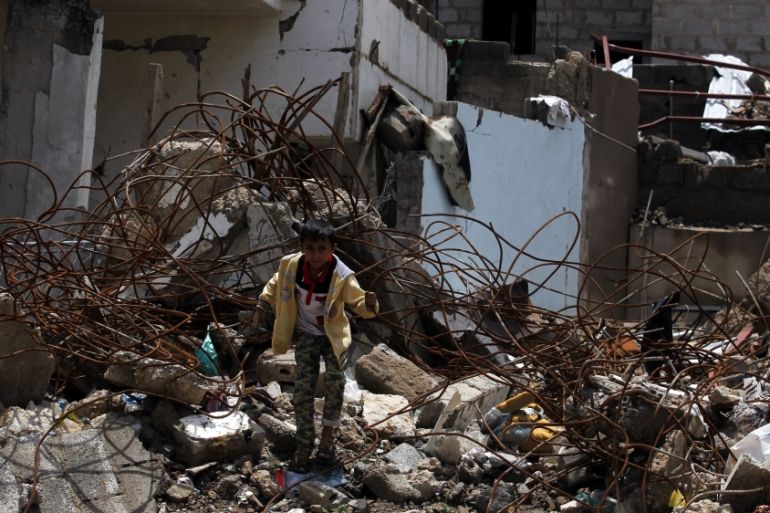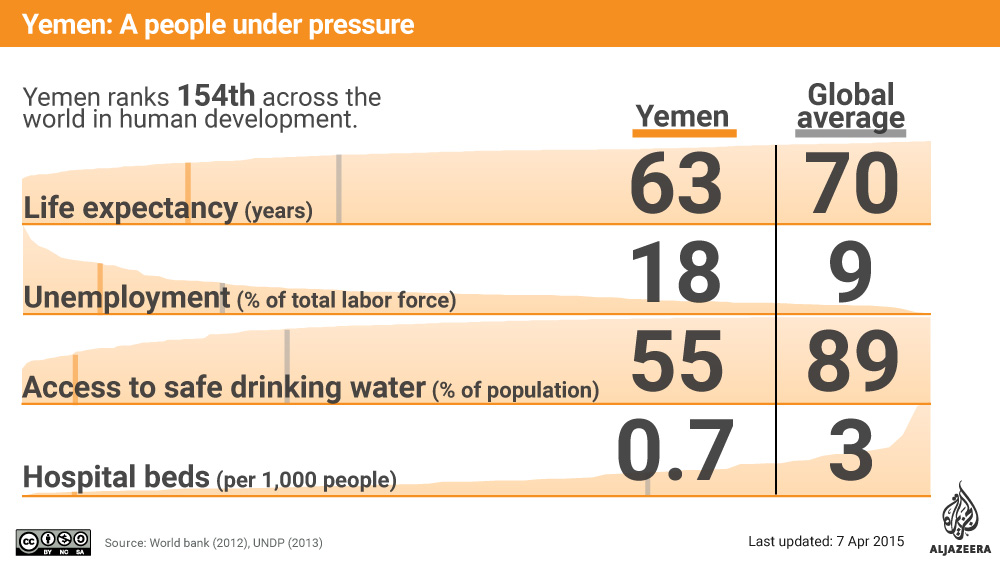JIAT disputes claims against Arab coalition in Yemen
Experts concede ‘shortcomings’ in only two cases out of the eight levelled by UN and aid groups against Arab coalition.

The Arab coalition fighting in Yemen have rebutted six claims by the UN and other aid groups that they have caused civilian deaths while conducting air raids in the country, but acknowledged “shortcomings” in two other cases.
A team – made up of coalition states Bahrain, Kuwait, Qatar, Saudi Arabia and the UAE, as well as Yemen – investigated a total of eight claims, including attacks on a residential area, hospitals, markets, a wedding and World Food Programme aid trucks.
Keep reading
list of 4 itemsUS blocks Palestinian push for full UN membership at Security Council
Why is Germany maintaining economic ties with China?
UN’s Libya envoy resigns citing no hope for political progress
The Joint Incident Assessment Team (JIAT), which consists of 14 members experienced in military and legal fields, published a report on their findings on Friday.
READ MORE: UN removes Arab coalition from child rights blacklist
“We found shortcomings in two cases, while the rest were in line with international humanitarian law,” Lieutenant-General Mansur al-Mansur, JIAT’s Bahraini spokesman and legal adviser, said in a press conference in Riyadh.
The JIAT said in one case a residential building in the al-Makha directorate was affected by coalition’s bombing as a result of “inaccurate intelligence information”.
“The investigating team found that the intended target was a residential complex, which had already been partly affected by unintentional bombing, due to the coalition forces responding to inaccurate intelligence information,” the JIAT said in the report.
The team recommended that compensation should be awarded to the families of the victims.
READ MORE: Resolution still elusive in war-torn Yemen
In another instance, according to the report, Haydan Hospital in Saada governorate was bombed after “it became clear that the building was a medical facility which was being used by Houthi armed militias as a military shelter”.
“This was in clear violation of the rules of international humanitarian law,” the JIAT admitted, “however, no casualties resulted from the bombing.”
The report said the coalition forces warned Medecins Sans Frontieres (MSF), before conducting the operation.
When detailing their findings on six other incidents, the JIAT disputed reported casualty figures and denied any wrong doing by coalition forces.
The team said they determined that there was “no breach of protocol or the rules of the international humanitarian law” by the coalition forces in any of these incidents.
‘We accept any independent group’
Yemeni Information Minister Mohamed Qubaty told Al Jazeera from Aden on Saturday that reports of coalition forces targeting civilians were not independent, and were coming from groups that sided with the Houthis.
The minister also said that Houthis were purposely using locations near hospitals and civilian areas from which to strike at coalition forces.
|
|
Referring to the coalition destroying World Food Programme trucks, the minister said there was no coordination between WFP and the government on the movement of the vehicles.
“We know the way Houthis can force people”, so that while “there might have been food on top of these cars or caravans carrying them, but underneath them there are munitions”, the minister said.
“All the time they have been using these tactics all across the place.”
The minister, however, conceded that some civilians have become victims, but he denied it was deliberate targeting by coalition forces.
“It can happen. There are some damages. We don’t deny that there sometimes [are] some damages but in all, and overall, the coalition forces have been all the time targeting specific military targets,” he said.
Asked about criticism that the JIAT report was not independent as it was carried out by coalition states, the minister said he would have no objection to an independent investigation of the situation on the ground in Yemen – including of the Houthis and other rebels targeting civilians and committing war crimes.
“Why not? We accept any independent group to come and assess on the ground what’s happening actually on the ground. Not take by hearsay what is being said by the Houthis or some people that are far away from these areas.”
At war since 2012
Yemen descended into chaos after the 2012 removal of longtime president Ali Abdullah Saleh, whose forces are fighting alongside the Houthi fighters.
Security deteriorated further after the Houthis swept into the capital, Sanaa, and pushed south, forcing President Abd-Rabbu Mansour Hadi’s government to flee into exile in March last year.
In 2015, Saudi Arabia formed a coalition of Arab states to defeat the Houthis in Yemen. The coalition now includes Qatar, Kuwait, the UAE, Bahrain, Egypt, Morocco, Jordan, Sudan and Senegal.
READ MORE: More than 300,000 children going hungry in Yemen: UN
Several of these countries have sent troops to fight on the ground in Yemen, while others have only carried out air strikes.
The US government regularly launches air strikes on al-Qaeda and Islamic State of Iraq and the Levant (ISIL) group targets in Yemen.
As of January 2016, 2,800 civilians had been killed by the fighting in Yemen, with 8,100 casualties overall.
Both sides have been accused of killing civilians: the United Nations High Commissioner for Human Rights has estimated that the coalition air strikes caused almost two-thirds of reported civilian deaths, while the Houthis have been accused of causing mass civilian casualties due to their siege of Taiz, Yemen’s third-largest city.
